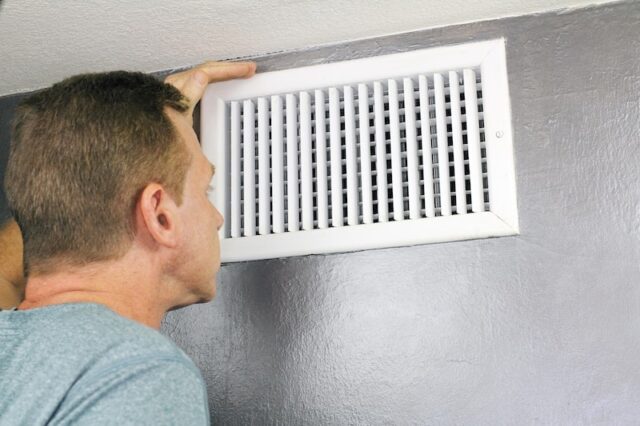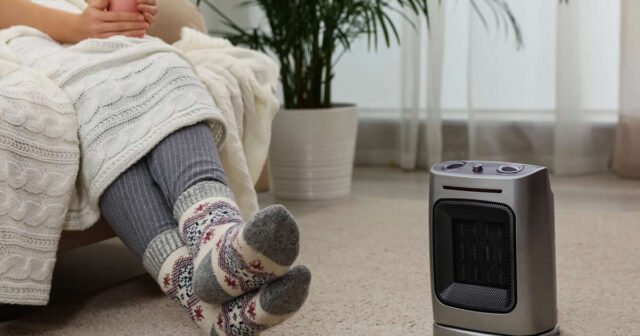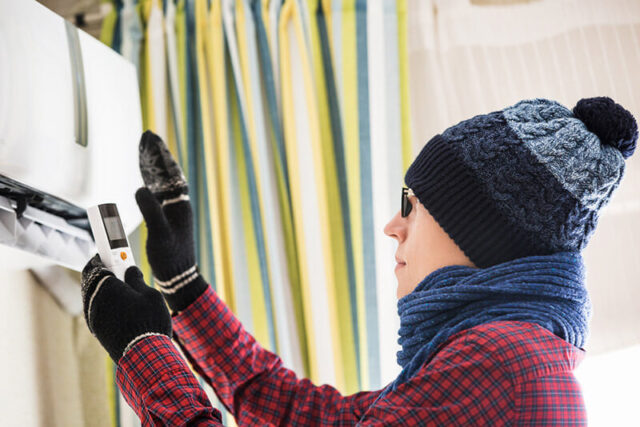
As winter approaches, it is essential to make sure your home’s heating and cooling system is functioning properly. Proper maintenance of your HVAC system ensures an energy-efficient space throughout the cold months.
With these simple tips and tricks, you can reduce energy costs by optimizing performance without investing in costly repairs or replacements. Utilize this guide for essential guidelines on how to prepare your HVAC system for winter now and save yourself the worry of expensive malfunctions down the line!
Need your HVAC system serviced? Check out https://www.trustsmartair.com/ if you live in the Oklahoma City area.
8 HVAC tips for winter
Here are some crucial HVAC tips for the winter.
1. Change Your Furnace Filter
A key step in winter HVAC maintenance is to ensure your furnace filter is changed regularly. A clogged filter can restrict airflow, leading to a decrease in system efficiency and increased energy costs. It’s recommended that you check the air filter every month and change it at least once every three months during the winter season.
2. Inspect Your Ducts and Seals for Leaks
Leaky ducts can lead to a decrease in efficiency, so it’s important to inspect them for any potential leaks before winter arrives. You should use a flashlight and mirror to check the condition of your ducts, looking out for signs of corrosion or loose connections.

Sealing up any cracks or holes with mastic sealant will help ensure warm air remains within the system and prevent heat loss.
3. Set Your Thermostat to 68 Degrees or Lower
Setting your thermostat to 68 degrees or lower can help reduce energy costs significantly. When it is consistently colder outside, keep the temperature at the lower end of your comfort zone. This will ensure that your HVAC system doesn’t have to work harder than necessary to maintain a comfortable indoor environment.
Additionally, if you’re leaving the house for an extended period of time, it’s a good idea to turn your thermostat down even lower so that you’re not wasting energy while away.
4. Get a Programmable Thermostat
Programmable thermostats are a great way to monitor and adjust the temperature in your home throughout the winter months. With this type of thermostat, you can set your heating system to turn on and off at predetermined times so that you don’t waste energy when it’s not necessary. This helps keep temperatures consistent while also reducing energy costs.
5. Close Vents in Unused Rooms
Closing the vents in unused rooms is an effective way to reduce energy costs. By keeping these rooms closed, you can ensure that your HVAC system isn’t wasting energy by heating or cooling areas that no one is using. Additionally, closing off these additional spaces will help maintain a consistent temperature throughout the other living spaces of your home.
6. Use Space Heaters Sparingly

Space heaters can be an effective way to supplement your heating system in colder climates. However, it’s important to use them sparingly. Space heaters are typically a lot less energy efficient than central heating systems, so they should only be used as necessary when temperatures drop particularly low.
Additionally, it’s important to remember that space heaters can be a fire hazard, so they should only be used in accordance with safety instructions.
7. Bundle Up, Wear Multiple Layers of Clothes to Stay Warm Indoors
It may seem counterintuitive, but wearing multiple layers of clothing indoors can help you conserve energy during the winter months. Instead of cranking up the heat to stay warm, try bundling up with sweaters or blankets and save your HVAC system some work!
This is especially helpful when the temperature is really cold outside since it reduces the workload of the heating system and thereby reduces energy costs.
8. Drink Plenty of Fluids and Eat Healthy Foods to Help Keep Your Body Warm
Drinking plenty of fluids and eating healthy foods can help your body stay warm during the winter months. Water, herbal teas, and hot soups are all good options for keeping your body hydrated and maintaining an optimal internal temperature.
Eating a balanced diet that consists of fruits, vegetables, whole grains, lean proteins, and healthy fats can also help to keep your body warm and insulated. Additionally, avoiding processed foods, saturated fats, and sugary snacks can provide additional protection against the cold.
Common HVAC Issues During Winter

During winter, temperatures can drop drastically and many HVAC systems start to malfunction due to the cold. To avoid any serious repairs or disruptions in heat and comfort, it is important to inspect your system regularly and pay particular attention to the following potential issues.
Insufficient airflow
Cold air might be coming out of your registers but that does not mean you are getting adequate airflow. Low airflow can be caused by a dirty or clogged filter, blocked ducts, or problems with the blower motor or fan belt. It’s important to have these issues addressed quickly in order to maximize energy efficiency and keep your home comfortable during winter.
Frozen air conditioner lines
If outdoor temperatures drop below freezing, it is possible that water droplets condensation on your outside unit may turn into ice and develop blockages which will prevent airflow through the system. To prevent this, you should make sure connectors are tightly sealed, keep the surrounding area clear of debris, trim back bushes if necessary for better access and install an enclosure if at all possible.
Thermostat problems
Thermostats tend to malfunction more often when temperatures drop drastically so it’s a good idea to check them regularly for proper operation throughout winter. If you notice any strange behavior from your thermostat such as turning on or off unexpectedly, not keeping correct time or readings being off/inconsistent then you should contact a professional for assistance right away.
Conclusion

Preparing your HVAC system for winter doesn’t have to be difficult or expensive. By following these simple tips, you can ensure that your home will stay comfortable and energy-efficient throughout the cold months ahead.
With the right preparation, you can avoid costly breakdowns and save yourself money in the long run. So take some time to invest in your system today and enjoy a warm, comfortable winter tomorrow.












